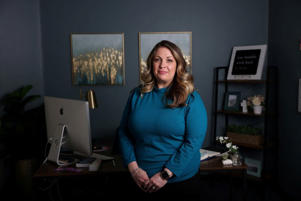© Thomson Reuters FILE PHOTO: U.S. Supreme Court takes up case of web designer who objects to same-sex marriage
By Andrew Chung and Nate Raymond
WASHINGTON (Reuters) – The U.S. Supreme Court on Monday began hearing arguments in a major case pitting LGBT rights against a claim that the constitutional right to free speech exempts artists from anti-discrimination laws in a dispute involving an evangelical Christian web designer who refuses to provide her services for same-sex marriages.
© Thomson Reuters FILE PHOTO: Scenes of capitol hill in Washington, U.S.
The justices were hearing Denver-area business owner Lorie Smith’s appeal seeking an exemption from a Colorado law that bars discrimination based on sexual orientation and other factors. Lower courts ruled in favor of Colorado, including the Denver-based 10th U.S. Circuit Court of Appeals in 2021.
Smith, who runs a web design business called 303 Creative, contends that Colorado’s Anti-Discrimination Act violates the right of artists – including web designers – to free speech under the U.S. Constitution’s First Amendment by forcing them to express messages through their work that they oppose.
The case follows the Supreme Court’s narrow 2018 ruling in favor of Jack Phillips, a Christian Denver-area baker who refused on religious grounds to make a wedding cake for a gay couple. The court in that case stopped short of carving out a free speech exemption to anti-discrimination laws.
Like Phillips, Smith is represented by attorneys from the Alliance Defending Freedom, a conservative religious rights group. The Supreme Court did not take up one aspect of her challenge to Colorado law based on religious rights also protected by the First Amendment, focusing on free speech instead.
Colorado, civil rights groups and numerous legal scholars have said that endorsing Smith’s free speech arguments could lead to widespread discrimination against LGBT people and others.
“It would encompass not only a business’s objections to serving certain customers motivated by sincerely held religious beliefs, but also objections motivated by ignorance, whim, bigotry, caprice and more – including pure expressions of racial, sexist or anti-religious hatred,” the state wrote in a legal brief to the Supreme Court.
Public accommodations laws exist in many states, banning discrimination in areas such as housing, hotels, retail businesses, restaurants and educational institutions.
Colorado first enacted one in 1885. Its current law bars businesses open to the public from denying goods or services to people because of race, gender, sexual orientation, religion and certain other characteristics, and from displaying a notice to that effect.
The Supreme Court, with its 6-3 conservative majority, has become increasingly supportive of religious rights and related free speech claims in recent years even as it has backed LGBT rights in other cases. The court legalized gay marriage nationwide in a landmark 2015 decision and in 2020 expanded protections for LGBT workers under federal law.
Smith, 38, said she believes that marriage should be limited to opposite-sex couples, a view shared by many conservative Christians. She preemptively sued Colorado’s civil rights commission and other state officials in 2016 because she feared she would be punished for refusing to serve gay weddings.
Similar legal fights involving other small business including a wedding photographer and a calligrapher owners have been waged in other states.
A ruling in Smith’s case is expected by the end of June.
(Reporting by Andrew Chung in Washington and Nate Raymond in Boston; Editing by Will Dunham)










